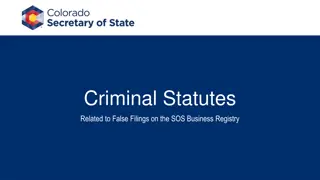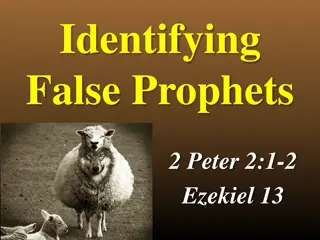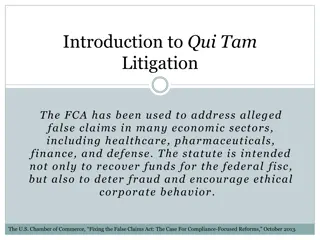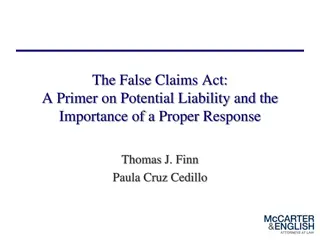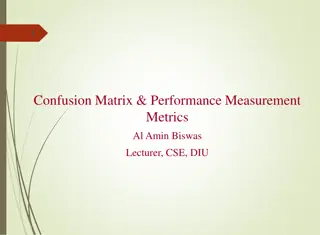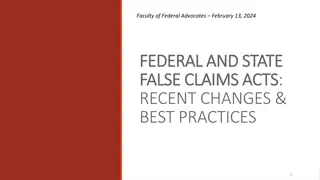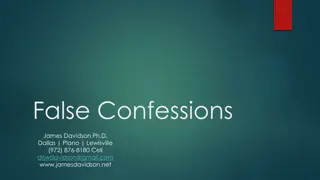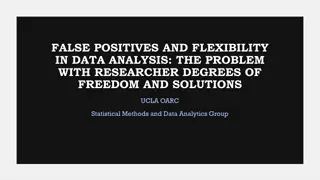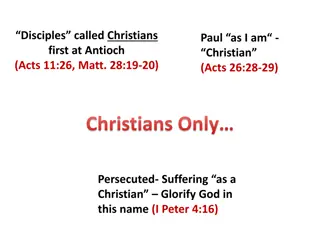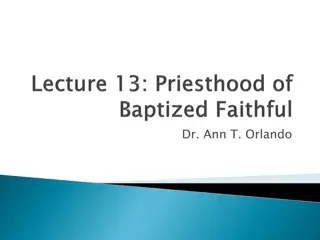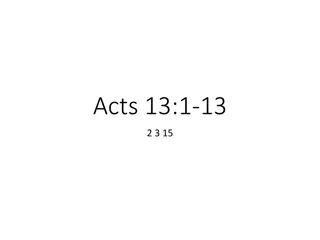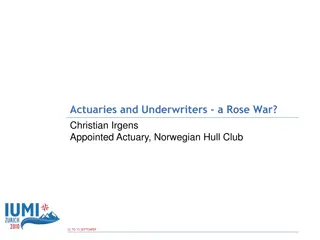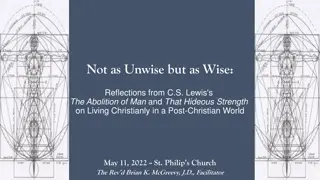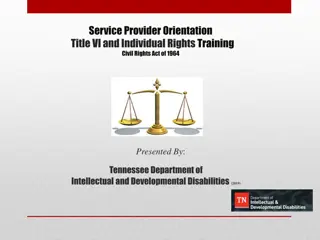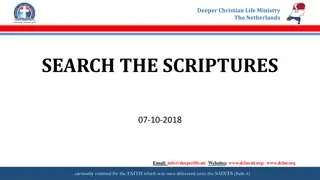Early Christian Civil Wars: Understanding Dissension and False Teachings
The early Christian congregations faced internal conflicts in the form of theological and leadership wars. These disputes were largely driven by personalities, as revealed in various New Testament writings. Questions for reflection are posed regarding encountering false teachings, managing civil wars within faith communities, and the contemporary battles faced by Catholics. The historical contexts of key sources like 1 John and 2 John shed light on the origins and composition of these texts, providing valuable insights into the challenges early Christians grappled with.
Download Presentation

Please find below an Image/Link to download the presentation.
The content on the website is provided AS IS for your information and personal use only. It may not be sold, licensed, or shared on other websites without obtaining consent from the author. Download presentation by click this link. If you encounter any issues during the download, it is possible that the publisher has removed the file from their server.
E N D
Presentation Transcript
Session 2: Early Christian Civil Wars The problem of dissention and false teachings
Early Christian Civil Wars Opening Remarks The early civil wars in the Christian congregations were on two fronts: o Theological wars (Who is Christ?) o Leadership wars (Whose in charge?) The civil wars appear to be largely personality- driven. Most of the later NT letters deal with (reveal) the real growing pains of the early Church.
Early Christian Civil Wars Questions for Theological Reflection 1. What are false teachings that you encounter in your ministry? 2. Are there civil wars occurring in your faith community? How do you choose sides? 3. What civil wars are Catholics fighting today?
Early Christian Civil Wars New Testament Sources: Apostolic Fathers Sources: The First Letter of John The Second Letter of John The Third Letter of John The Letter of Jude The Second Letter of Peter First Clement Polycarp s Epistle to the Philippians
Early Christian Civil Wars Setting the Context 1st& 2ndcentury Christian congregations communicated almost exclusively (in written form) by letters. In fact, 21 of the 27 NT writings are letters. NT and AF letters range in authorship from known authors (e.g., Paul s 7 letters) to pseudonymous authors (e.g., Jude, 1 and 2 Peter) to anonymous authors (e.g., First John, Hebrews). The nine later NT writings (8 of which are letters ) share a common concern about dissenters and false teachers. .
Early Christian Civil Wars Historical Context of the Sources
The historical context of 1 John 1,2, and 3 John were all addressed to the Johannine community, a church(es) likely located in Asia Minor, possibly Ephesus. The author of First John is unknown. He never identified himself in the letter. It was composed between 90-95 CE.
The historical context of 2 John Second John was written by the Elder (presumably a leader among the Johannine churches) to the chosen Lady and her children (a specific Johannine congregation). Likely composed between 90-95 CE somewhere in Asia Minor. Second John is only 13 verses. The shortest NT writing.
The historical context of 3 John Third John is another written by the elder of the Johannine community and this time addressed to a specific person, Gaius (a likely leader of the one of the Johannine churches). Composed between 90-95 CE in Asia Minor. Third John is only 15 verses. The exact order of composition of 1, 2 and 3 John in unknown.
The historical context of Jude Very little is known about the historical setting of the Letter of Jude. We do not know the author, audience, or place of composition. Scholars theorize it was written between 100- 140 CE, given its internal evidence. Its attribution to Jude, a brother of Jesus is most interesting. (see Mark 6:3; Matt 13:54).
The historical context of 2 Peter Second Peter is equally perplexing as Jude in terms of its historical setting. We do not know the author, audience or place of composition. The author clearly intends to portray himself as Peter the apostle who made a final statement prior to his death (2 Pet 1:1, 13-15). It is clearly dependent upon the Letter of James see the strong parallel of content and vocabulary between Jude 4-18 and 2 Pet 2:1-3:3. So, the date of composition is sometime after Jude. Scholars consider Second Peter the last written document of the New Testament, written as late as 140 CE.
The historical context of 1 Clement Clement was the third bishop of Rome but few scholars today believe he authored this letter. It is a letter written by the (unidentified) leaders in the church of Rome to the leaders of the church in Corinth. It was written from Rome, probably very near the end of the 1stcentury CE.
The historical context of Polycarps Epistle to the Philippians Polycarp, Bishop of Smyrna, wrote this letter to the church in Philippi. The letter is thought to have been written from the city of Smyrna, around the year 120 CE. One of the remarkable features of this letter Polycarp s extensive knowledge of the early Christian tradition, which is evidenced by his use of most of the writings that would eventually make up the New Testament as well as texts now referred to as the Apostolic Fathers (the letters of Ignatius and 1 Clement).
Early Christian Civil Wars Who were these dissenters/false teachers? And, what were they saying/doing? .
Broad Sketch First John is dealing with a dissenting faction. Second John is warning against deceivers. Third John is confronting an individual who challenges the authority of the elder. Second Peter and Jude are dealing with intruders and false teachers and scoffers in their communities. 1 Clement and Polycarp s Epistle to the Philippians are addressing some of the tensions in leadership of the early Christian communities.
The dissenting faction of 1 John Children, it is the last hour; and just as you heard the antichrist was coming, so now many antichrists have appeared. Thus we know this is the last hour. They went out from us, but they were not really of our number; if they had been, they would have remained with us. Their desertion shows that none of them was of our number. - 2:18-19 Who is the liar? Whoever denies that Jesus is the Christ. Whoever denies the Father and the Son, this is the antichrist. -2:20 Every spirit that acknowledges that Jesus Christ come in the flesh belongs to God. -4:2
The progressives & deceivers of 2 John Many deceivers have gone out into the world, those who do not acknowledge Jesus as coming in the flesh; such is the deceitful one and the antichrist. - v. 7 Anyone who is so progressive as not to remain in the teaching of the Christ does not have God; whoever remains in the teaching has the Father and the Son. v. 9 If anyone comes to you and does not bring this doctrine, do not receive him in your house or even greet him; for whoever greets him shares in his evil works. v. 10
The problem of Diotrephes in 3 John I wrote the church, but Diotrephes, who loves to dominate, does not acknowledge us. Therefore, if I come, I will draw attention to what he is doing, spreading evil nonsense about us. v. 9 And not content with that, he will not receive the brothers, hindering those who wish to do so and expelling them from the church. v. 10.
The intruders of Jude For there have been some intruders, who long ago were destined for this condemnation, godless persons who pervert the grace of our God into licentiousness and who deny our only Master and Lord, Jesus Christ. v. 4 They are waterless clouds blown about by the wind, fruitless trees in late autumn, twice dead and uprooted. v. 12 On those who waver, have mercy; save others by snatching them out of the fire; on others have mercy with fear, abhorring even the outer garment stained by the flesh. v. 23
The false teachers and scoffers in 2 Peter There were also false prophets among the people, just as there will be false teachers among you, who will introduce destructive heresies and even deny the Master who ransomed them. 2:1 They [false teachers] seduce unstable people, and their hearts are trained in greed. Accursed children! 2:14 There are scoffers who will say, Where is the promise of his coming?...But do not ignore this one fact, beloved, that with the Lord one day is like a thousand years and thousand years like one day. 3:3-8
The cliques and factions of First Clement We realize that we have been slow to turn our attention to the matters causing disputes among you, loved ones, involving that vile and profane faction that is alien and foreign to God s chosen people. -1:1 [The] church of the Corinthians is reported to have created a faction against its presbyters, at the instigation of one or two persons. 47:6 And this report has reached not only us but even those who stand opposed to us. 47:7 The letter urges the community in Corinth to dispose of this problem quickly, appealing to Christian love, encouraging wrongdoers to seek pardon, and calling on the faithful to pray for the dissenters. 48:1-56:16
The antichrists and disgraced presbyter of Polycarp s Epistle to the Philippians Polycarp warns the church in Philippi to avoid false teachings and those who deceive vulnerable community members. He refers to such individuals as antichrist[s] and the first-born of Satan. 7:1-2 He also takes up the matter of Valens ( once a presbyter among you ) and his wife, who apparently had stolen money from the congregation (11:1-12:3). He advises the community to forgive Valens and his wife if they truly repent: Rather than judge such people as enemies, call them back as frail and wayward members, so as to heal your entire body. 11:4
Diverse appeals among the early Christian communities Jude and Second Peter launch dehumanizing attacks on their opponents: But these people revile what they do not understand and are destroyed by what they know by nature like irrational animals. Woe to them! Jude 10-11 . The Johannine epistles castigate the secessionists: They went out from us, but they were not really of our number; if they had been, they would have remained with us. Their desertion shows that none of them was of our number. 1 John 2:19 1 Clement encourages dissenters to seek pardon: Thus you who laid the foundation of the faction should be subject to the presbyters and accept the discipline that leads to repentance. 1 Clem. 57:1 Polycarp urges forgiveness for the former presbyter who embezzled community funds: Rather than judge such people as enemies, call them back as frail and wayward members, so as to heal your entire body. Pol. Phil. 11:4
Early Christian Civil Wars Opening Remarks The early civil wars in the Christian congregations were on two fronts: o Theological wars (Who is Christ?) o Leadership wars (Whose in charge?) The civil wars appear to be largely personality- driven. Most of the later NT letters deal with (reveal) the real growing pains of the early Church.
Early Christian Civil Wars Questions for Theological Reflection 1. What are false teachings that you encounter in your ministry? 2. Are there civil wars occurring in your faith community? How do you choose sides? 3. What civil wars are Catholics fighting today?


